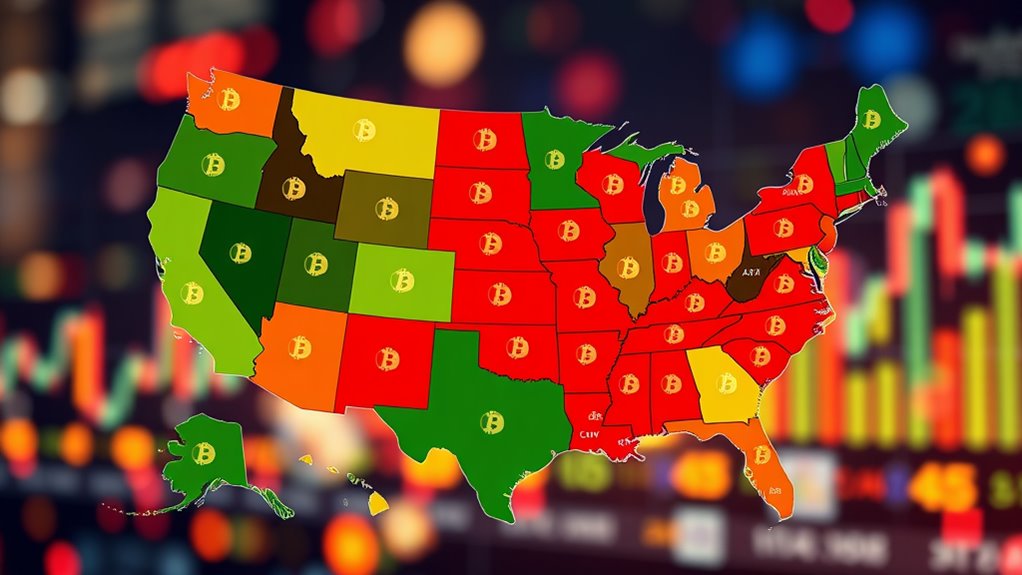
State Laws on Bitcoin: Crypto Rules by State in the U.S.
State laws on Bitcoin and cryptocurrency in the U.S. differ widely. New York has strict licensing requirements through the BitLicense framework, while California introduced the Digital Financial Assets Law for compliance. In Texas, minimal regulation encourages innovation, whereas Florida works to clarify licensing amid financial technology growth. Arizona explores proposals for Bitcoin as legal tender. Meanwhile, regulations in Washington emphasize security audits. Each state addresses consumer protection and support for innovation in unique ways. More insights follow.
Table of Contents
Key Takeaways
- States in the U.S. have varying Bitcoin regulations, with some like New York enforcing stringent licensing requirements and others like Texas promoting minimal oversight.
- Wyoming has enacted nearly 30 laws since 2019, categorizing digital assets and supporting the registration of decentralized autonomous organizations (DAOs).
- California’s Digital Financial Assets Law emphasizes licensing for crypto businesses while balancing innovation and consumer protection measures.
- Florida’s recent amendments clarify cryptocurrency licensing and promote financial technology innovation with a focus on consumer protection.
- Arizona is exploring proposals to recognize Bitcoin and other cryptocurrencies as legal tender, enhancing their adoption for everyday transactions.
Overview of Bitcoin Regulations in the U.S

As the landscape of digital currencies evolves, the regulation of Bitcoin in the United States presents a complex picture shaped by both state and federal laws.
States like Colorado, Nebraska, Wyoming, and Texas showcase varied approaches to Bitcoin regulation. While Colorado encourages blockchain innovation without direct Bitcoin legislation, Nebraska has established the Financial Innovation Act, governing digital assets.
Wyoming’s pro-crypto laws and Texas’s supportive regulations aim to attract blockchain firms. Additionally, some states experiment with regulatory sandboxes, allowing startups to test new technologies.
Federal agencies, including the SEC and CFTC, provide overarching guidelines, while many states require money transmitter licenses to guarantee compliance and protect consumers. Furthermore, state and federal regulations create a dynamic landscape that continuously evolves as the technology and market mature.
This multifaceted regulatory environment reflects the diversity of state responses to cryptocurrency.
New York: Stringent Licensing and Compliance Requirements

New York’s regulatory environment for cryptocurrency businesses is characterized by its stringent licensing and compliance requirements, which are primarily enforced through the BitLicense framework.
Obtaining a BitLicense entails several specific obligations:
- Application Fee: A standard fee of $5,000 is required.
- Business Registration: Companies must be registered in the U.S., ideally in New York.
- Compliance Documents: Internal risk policies and anti-money laundering (AML) documents must be prepared.
- Local Presence: Personnel must be based in New York to manage the business.
- Financial Requirements: A surety bond or trust account of at least $500,000 is necessary.
These measures aim to guarantee consumer protection and promote market confidence, albeit at the cost of significant barriers to entry for new businesses.
California: Emerging Regulatory Frameworks and Challenges

California is currently developing an emerging regulatory framework for digital financial assets, highlighted by the Digital Financial Assets Law (DFAL) enacted in October 2023.
This law emphasizes consumer protection, requiring businesses to meet specific licensing and compliance standards to operate effectively within the state.
As California navigates the complexities of implementation and pending legislation, it aims to foster innovation while prioritizing the safety and transparency needed for consumer confidence in the crypto market.
Pending Legislation Overview
Amid the evolving landscape of cryptocurrency regulation, Assembly Bill 1052 represents a significant step toward establishing a thorough framework for digital assets in California.
This bill aims to address several key areas:
- Official recognition of digital assets as valid payment methods.
- Protection against discrimination for individuals using digital currencies.
- Prohibitions on public officials promoting digital assets to avoid conflicts of interest.
- Support for merchants, with nearly 100 currently accepting Bitcoin.
- Potential influence on other states to adopt similar regulations.
While this legislation could set a national precedent, challenges remain.
The complexity of cryptocurrency regulation, differing state laws, and the need for standardized federal guidelines complicate the implementation of such frameworks.
Consumer Protection Focus
As the landscape of cryptocurrency regulation continues to evolve, consumer protection has emerged as a significant focus in California’s regulatory framework regarding digital assets.
The state enacted the Digital Financial Assets Law, which requires businesses to obtain licenses from the Department of Financial Protection and Innovation to guarantee compliance with safety standards.
Key consumer protections include mandatory risk disclosures, stablecoin reserve requirements, and penalties for non-compliance.
Additionally, the framework demands businesses investigate assets before listing them, provide detailed transaction receipts, and offer live customer support.
While California aims to lead in digital asset policy, it faces challenges in balancing innovation with consumer welfare, especially given the decentralized nature of cryptocurrencies that complicates regulation. Furthermore, California’s approach could serve as a model for future global finance as other states and countries look to create their own regulatory frameworks.
Texas: Encouraging Innovation With Minimal Regulation

Texas has established a regulatory environment that promotes innovation in the cryptocurrency space while maintaining minimal oversight.
The state has defined virtual currency and enacted the Texas Virtual Currency Bill, which legitimizes its use and provides clear guidelines for businesses.
Regulatory Environment Overview
In a landscape where cryptocurrency is rapidly evolving, Texas stands out as a state that fosters innovation while maintaining a regulatory environment that is relatively accommodating.
The state’s framework encourages the growth of cryptocurrency and blockchain technology through several key features:
- Legislative Support: Bills like HB 4258 and SB 21 promote Bitcoin integration.
- Minimal Licensing Requirements: Exchanges need licenses only for fiat transactions.
- Energy Abundance: Low electricity costs attract cryptocurrency mining operations.
- Legal Recognition: Virtual currencies are recognized under commercial laws.
- State Oversight: The Texas State Securities Board guarantees compliance and prevents fraud.
These elements collectively position Texas as a favorable environment for crypto-related businesses and innovation, contributing positively to the state’s economic landscape. Additionally, the state’s approach aligns with the principles of decentralized Bitcoin, ensuring that innovation isn’t stifled by overly restrictive regulations.
Support for Blockchain Initiatives
Support for blockchain initiatives in Texas highlights the state’s commitment to fostering innovation through a favorable regulatory environment.
Texas benefits from abundant energy resources, making it an attractive location for cryptocurrency mining operations. Business-friendly policies encourage fintech startups and established companies to explore blockchain technology.
The Texas Blockchain Council, established in 2021, advocates for the adoption of blockchain and collaborates with lawmakers to create supportive policies. Major cities like Austin and Dallas are emerging as key fintech hubs, leveraging blockchain for diverse applications.
Additionally, state investments in blockchain aim to further enhance industry development. These efforts collectively position Texas as a leader in blockchain innovation, promoting job creation and economic growth while maneuvering regulatory challenges.
Florida: Clarified Licensing and Financial Technology Sandboxes

As Florida embraces the evolving landscape of cryptocurrency, the state has implemented new regulations to clarify licensing requirements and promote financial technology innovation.
The recent amendments under CS/HB 273, effective January 1, 2023, redefine how virtual currencies are treated within the state.
- Definition of Virtual Currency: Clarified under money services business laws.
- Licensing Relief: Direct peer-to-peer transactions are exempt from licensing.
- Intermediary Regulations: Licenses are required for those controlling transactions.
- Financial Requirements: MSBs must maintain a minimum net worth and adhere to operational standards.
- Consumer Protection: Regulations aim to safeguard against financial crimes related to cryptocurrencies.
These changes foster a more favorable environment for cryptocurrency activities and financial technology growth in Florida.
Wyoming: A Beacon of Crypto-Friendly Legislation

Recognized for its progressive stance on cryptocurrency, Wyoming has emerged as a leader in crypto-friendly legislation, having enacted nearly 30 laws since 2019 that clarify and legitimize various aspects of digital currency use.
These laws categorize digital assets into three classes: digital consumer assets, digital securities, and virtual currencies, simplifying legal rights under the Uniform Commercial Code.
Wyoming’s environment promotes innovation, particularly with Decentralized Autonomous Organizations (DAOs), which can register as LLCs.
Tax advantages, such as the absence of personal income tax and low business registration fees, attract crypto companies.
Additionally, Special Purpose Depository Institutions (SPDIs) bridge traditional banking with digital finance, enhancing the state’s reputation as a hub for cryptocurrency and blockchain enterprises.
Arizona: Legal Tender Proposals and State Agency Acceptance

Arizona is exploring the potential of bitcoin as legal tender through various legislative proposals.
Bills such as SB 1062 and SB 1341 aim to allow bitcoin to be used for debts and obligations, reflecting a growing interest in cryptocurrency within the state.
Additionally, initiatives like S.B. 1128 seek to enable state agencies to accept cryptocurrency payments, thereby modernizing financial transactions and enhancing convenience for residents.
Bitcoin as Legal Tender
The ongoing discussions regarding Bitcoin’s status as legal tender in Arizona highlight a notable shift in the perception of cryptocurrency within the state.
Arizona’s Senate Bill SB1062 proposes to recognize Bitcoin and other cryptocurrencies as legal tender, a move that could bring various implications, including:
- Enhanced adoption of Bitcoin for everyday transactions.
- Legal standing similar to that of the U.S. dollar.
- Attraction of financial innovation and investment to Arizona.
- Precedent for state autonomy in recognizing alternative payment forms.
- Ongoing concerns about Bitcoin’s volatility affecting economic stability.
While the bill has cleared the House Commerce Committee, it awaits further legislative action.
Additionally, Arizona’s potential adoption of Bitcoin as legal tender could signal a broader trend towards increased cryptocurrency acceptance across the United States.
The outcome could shape Arizona’s economic landscape considerably, reflecting a growing interest in digital currencies.
State Agency Crypto Payments
As discussions about cryptocurrency gain traction, state agencies in Arizona are exploring the potential for accepting digital currencies as a form of payment.
Proposed legislation aims to modernize payment systems, allowing agencies to accept cryptocurrencies such as Bitcoin, Ethereum, Litecoin, and Bitcoin Cash for various financial obligations, including fines and taxes.
To guarantee smooth transactions, state agencies will partner with cryptocurrency service providers, who will manage the conversion of digital currencies into U.S. dollars.
However, transactions may incur service fees, which could be the responsibility of either the state or the payer.
If approved, this legislation could take effect as early as January 1, 2025, reflecting Arizona’s initiative to adapt to the evolving financial landscape.
Washington: Security Audits and Regulatory Demands

In Washington State, new regulations have introduced significant security audits and regulatory demands for cryptocurrency exchanges operating within its borders.
These rules aim to protect consumers while clarifying operational guidelines. Key requirements for exchanges include:
- Obtaining licenses from the Washington State Department of Financial Institutions.
- Undergoing periodic third-party audits to guarantee system integrity.
- Posting surety bonds ranging from $10,000 to $550,000 as security for customer compensation.
- Maintaining virtual currency reserves equal to customer funds.
- Complying with financial oversight bodies to prevent fraud and money laundering.
While some exchanges have exited Washington due to regulatory costs, others, like Coinbase, continue to operate under these new guidelines, highlighting the ongoing evolution of cryptocurrency regulation in the state.
Illinois: Establishing Legal Procedures for Digital Assets

Illinois has taken significant steps to establish an extensive legal framework for digital assets, reflecting a growing recognition of the need for consumer protection and regulatory oversight in the cryptocurrency space.
The Consumer Financial Protection and Innovation Package includes two key bills that regulate digital asset businesses and empower the Illinois Department of Financial and Professional Regulation (IDFPR) to enforce consumer protection laws.
Digital asset exchanges must now obtain licenses, ensuring they meet customer protection standards.
Additionally, the Revised Uniform Fiduciary Access to Digital Assets Act allows fiduciaries to manage digital assets, facilitating estate planning.
With these initiatives, Illinois aims to create a safe environment for digital asset transactions while fostering innovation in blockchain technology across various sectors.
Trends in State Regulations: Consumer Protection vs. Innovation

While states recognize the importance of embracing innovation in the cryptocurrency sector, they also face the challenge of ensuring consumer protection. This balance influences how states approach regulation, with some emphasizing innovation while others prioritize safety.
States strive to balance innovation in cryptocurrency with essential consumer protection, shaping diverse regulatory approaches across the nation.
Key trends include:
- Regulatory Sandboxes: States like Arizona test new technologies with relaxed rules.
- Pro-Crypto Legislation: Wyoming and Texas promote digital asset banking and mining.
- Consumer Safeguards: New York and California enforce strict regulations to protect consumers.
- Blockchain in Governance: Vermont and West Virginia explore blockchain for public services.
- Compliance Challenges: Varied state regulations create hurdles for national crypto businesses.
The ongoing dialogue between innovation and consumer protection shapes the evolving landscape of cryptocurrency regulations across the U.S.
Frequently Asked Questions
How Do State Laws Differ From Federal Regulations on Bitcoin?
State laws on Bitcoin differ considerably from federal regulations, focusing on licensing and consumer protection. Each state establishes unique frameworks, leading to varied compliance costs, operational challenges, and opportunities for businesses within the cryptocurrency sector.
Can I Use Bitcoin for Everyday Transactions in Every State?
In a landscape dotted with varying regulations, using Bitcoin for everyday transactions isn’t universally accepted. While some states embrace it, others remain cautious, leading to a patchwork of acceptance across the nation.
Are There Any States That Do Not Regulate Bitcoin at All?
Certain states exhibit minimal or no regulations regarding Bitcoin, including Arkansas, Delaware, and Maryland. This lack of specific legislation creates an environment where cryptocurrency transactions can occur without formal oversight or restrictions, fostering potential innovation.
What Are the Penalties for Non-Compliance With State Bitcoin Regulations?
What happens when businesses ignore regulations? Non-compliance can lead to financial penalties, license suspensions, legal actions, and reputational damage, alongside increased compliance costs and potential IRS penalties for failing to report crypto income accurately.
How Can I Find Specific State Regulations on Bitcoin in My State?
To find specific state regulations on Bitcoin, individuals can consult official state government websites, legal databases, and specialized law firms. These resources provide extensive information on licensing, compliance requirements, and regulatory updates relevant to their state.
Conclusion
In summary, Bitcoin regulations differ markedly across the United States, reflecting diverse approaches to balancing consumer protection and innovation. For instance, New York’s strict licensing requirements contrast sharply with Texas’s more relaxed stance, highlighting the ongoing debate among states. Notably, a recent survey indicated that approximately 16% of Americans have invested in cryptocurrency, showcasing the growing interest in this digital asset. Understanding these regulations is essential for both consumers and businesses traversing the evolving crypto landscape.




